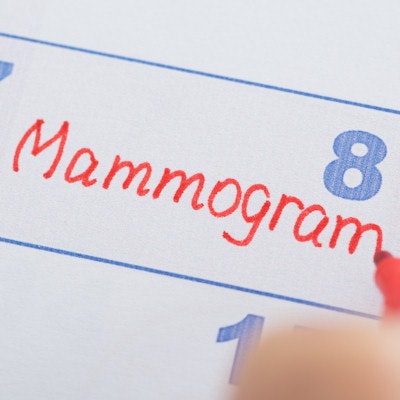
Women ages 75 and older should continue to undergo screening mammography if they are in good health, according to a study to be presented at the upcoming RSNA 2018 meeting in Chicago.
Guidelines as to when women should stop breast cancer screening have been contradictory, which has led to confusion, wrote a team led by Dr. Stamatia Destounis of Elizabeth Wende Breast Care in Rochester, NY. The 2009 guidelines released by the U.S. Preventive Services Task Force (USPSTF) stated there wasn't enough evidence to assess the benefits or harms of screening mammography for women ages 75 and older.
But other professional groups recommend that women continue to be screened as long as they are healthy, according to the researchers.
"Ongoing debate exists regarding the age to cease screening mammography," Destounis said in a statement released by the RSNA. "Our findings provide important data demonstrating that there is value in screening women over 75 because there is a considerable incidence of breast cancer."
Destounis and colleagues analyzed data from 763,256 screening mammography exams performed between 2007 and 2017; 76,885 (10%) were from women ages 75 and older. Of the total number of screening exams, cancer was diagnosed in 3,944 patients. The researchers then identified the number and type of cancers diagnosed in older women.
Among the 76,885 patients ages 75 and older, 645 cancers were identified, for a detection rate of 8.4 per 1,000 exams.
"For the relatively small percentage of our screening population that was comprised of women 75 and older, the patients diagnosed in this population made up 16% of all patients diagnosed with screening-detected cancers," Destounis said.
Lesions presented as masses 73% of the time, the researchers noted. Of the cancers identified, 82% were invasive and 98% were able to be surgically treated.
"[Our findings suggest] that most women 75 and over are in good health and want to pursue surgical excision," the group wrote.
The study results support continued breast cancer screening in older women, Destounis told AuntMinnie.com.
"A 75-year-old woman in the U.S. may live another 13 years, according to current life-expectancy estimates," she said. "It's clear that the benefits of screening after age 75 outweigh the harms: This population still reaps the benefits from early detection, that is, less-invasive treatment and decreased morbidity and mortality."




















